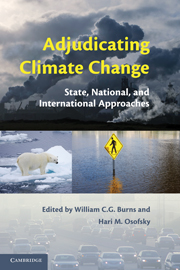Book contents
- Frontmatter
- Contents
- Foreword
- Acknowledgments
- Adjudicating Climate Change
- 1 Overview: The Exigencies That Drive Potential Causes of Action for Climate Change
- PART I SUBNATIONAL CASE STUDIES
- 2 State Action as Political Voice in Climate Change Policy: A Case Study of the Minnesota Environmental Cost Valuation Regulation
- 3 Litigating Climate Change at the Coal Mine
- 4 Cities, Land Use, and the Global Commons: Genesis and the Urban Politics of Climate Change
- 5 Atmospheric Trust Litigation
- PART II NATIONAL CASE STUDIES
- PART III SUPRANATIONAL CASE STUDIES
- 17 Conclusion: Adjudicating Climate Change across Scales
- Index
- References
4 - Cities, Land Use, and the Global Commons: Genesis and the Urban Politics of Climate Change
Published online by Cambridge University Press: 25 August 2009
- Frontmatter
- Contents
- Foreword
- Acknowledgments
- Adjudicating Climate Change
- 1 Overview: The Exigencies That Drive Potential Causes of Action for Climate Change
- PART I SUBNATIONAL CASE STUDIES
- 2 State Action as Political Voice in Climate Change Policy: A Case Study of the Minnesota Environmental Cost Valuation Regulation
- 3 Litigating Climate Change at the Coal Mine
- 4 Cities, Land Use, and the Global Commons: Genesis and the Urban Politics of Climate Change
- 5 Atmospheric Trust Litigation
- PART II NATIONAL CASE STUDIES
- PART III SUPRANATIONAL CASE STUDIES
- 17 Conclusion: Adjudicating Climate Change across Scales
- Index
- References
Summary
INTRODUCTION
Ruin is the destination which all men rush, each pursuing his own best interest in a society that believes in the freedom of the commons. Freedom in a commons brings ruin to all.
By quoting this pessimistic philosophy, the New Zealand Environment Court, in Genesis Power Ltd. v. Franklin District Council (“Genesis”), demonstrated its lack of faith in local governments as protectors of the Earth from climate change. Little wonder, then, that it mandated that a local district government set aside its concern for local environmental impacts and indigenous peoples' cultural resources, and permit the construction of a wind farm that could reduce carbon emissions. In describing the legal basis for its decision, the Environment Court echoed prevailing assumptions that climate change can only be dealt with from the top down. That is, nation-states implement international treaties by imposing concern on local governments that would otherwise, “in pursuit of their well-being, destroy existing stock of natural and physical resources so as to improperly deprive future generations of their ability to meet their needs.”
This chapter explores such a view of localities and its alternatives. We observe the seemingly contrary behavior of cities in the United States, which appear to have taken up the charge for climate protection despite the complete absence of the national influence identified as necessary by the New Zealand court and others. We then initiate an inquiry into the possible basis of these apparently against interest actions, drawing upon loose analogies to international relations theory.
- Type
- Chapter
- Information
- Adjudicating Climate ChangeState, National, and International Approaches, pp. 72 - 98Publisher: Cambridge University PressPrint publication year: 2009
References
- 1
- Cited by



